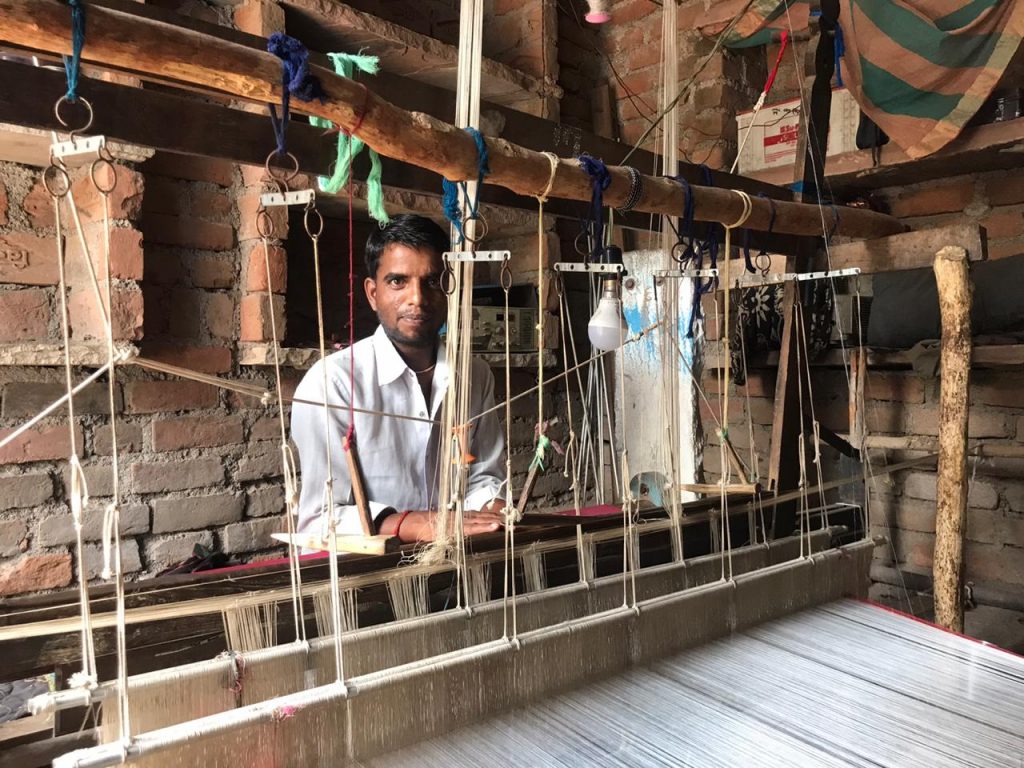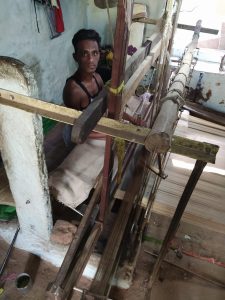Digital Empowerment Foundation (DEF) through its flagship programme Chanderiyaan has been demonstrating the power of digital intervention to improve the financial status of traditional artisans of Chanderi in Madhya Pradesh and creating a model for traditional-skill based clusters for over 10 years now.
By Muzaffar Ansari

Digital Empowerment Foundation (DEF) through its flagship programme Chanderiyaan has been demonstrating the power of digital intervention to improve the financial status of traditional artisans of Chanderi in Madhya Pradesh and creating a model for traditional-skill based clusters for over 10 years now. But the Covid-19 pandemic and the country-wide lockdown has adversely affected the weavers community with no specific government relief for the handloom clusters. Muzaffar Ansari, a representative of DEF from Chanderi, was part of the first batch of weavers of this digital intervention. Ansari, famously known as Kalle bhai, is a local celebrity who is a certified government tour guide and calligrapher. Moreover, despite being formally uneducated, he has been a speaker at Ted Talks, written research papers and books on Chanderi including one for DEF. Traditionally from a weaver’s family, in these uncertain times of Covid-19 he has observed and captured the difficulties that the weaver community is facing.
He has originally written this article in Hindi. The translated version is appended below.
सात सौ साल से भी पुराने चन्देरी वस्त्र उध्योग ने यूँ तो अपने सफ़र में कई उतार चढ़ाओ देखे हैं| मुग़ल शासन काल में तो एक बार सरकारी आदेश पारित हो कर इस उध्योग को बंद करने का परवाना मिल गया था पर ,फिर भी कहीं न कहीं यह अपने आपको बचाता आज हम तक पहुँचा है| चन्देरी के आबादी ,बाज़ार अधिकतर इसी कारोबार के सहारे ज़िंदा रहते है ,आप जब बुनकरों की बस्तियों से गुज़रते तब करघों की सुरीली धुन और कभी – कभी बुनाई करते हुए लोग संत कबीरदास जी के दोहे गुनगुनाते दिखते , झीनी- झीनी रे झीनी चुनरिया रे झीनी – झीनी सुनाई पड़ती| उनकी गलियों में अल – सुबह चारों ओर बिखरे कई प्रकार के रंग बिरंगे ताने- बाने दिखाई देना बंद हो गए बल्कि वो भजन वो गीत, वो टक- टक करघों की आवाज़ भी मद्धम होती जा रही है| ऐसे में कोई शक की बात नही की सेकडों हाथ ग़रीबों की मदद के लिए उठे है| पर ये भी सही है की मदद मिलना एक बात है और कारोबार बंद होना दूसरी बात है , कारोबार से सारी ज़िंदगी चलती है मदद से कुछ महीने या साल मात्र। कुछ पेपर एक सौ पचास करघे बंद होनी की बात कर रहे हैं पर में भी एक बुनकर परिवार का सदस्य हूँ और हमारा परिवार कैसी हालत से गुजर रहा है उस से हम कह सकते है की सारे बुनकरों के क्या हाल होंगे । वैसे तो चन्देरी में लोकडाउन से पहले 4785,करघों पर साड़ियाँ, दु पट्टे , सूट्स, स्टाल, और भी कई प्रकार के वस्त्र बनाए जा रहे थे । जिन बुनकरों के पास बुनाई का मटेरियल रखा था वह बुनकरों के करघे तब तक चालु थे अब वो भी बंद होते जा रहे हैं । कई बुनकर तो साड़ियाँ बना कर रखे हैं पर लोक डाउन की सख़्ती के कारण वो साड़ियाँ सेठ तक नही ले जा पा रहे हैं ।सेठ लोगों के पास ही कच्चा माल नही तो वो कहाँ से देंगे ,लिहाज़ा उन्होंने भी अपने हाथ खींच लिए ।वो कहते हैं क़ि जब हमारा माल ही नही बिक रहा तो आपकी मदद कैसे करें , ना कच्चा माल है न बिक्री। मई के आते / आते जो बंद लूम सैंकड़ों में है वो हज़ार पहुचने में देर नहीं है लोकडाउन मेंअगर सरकार बुनकरों को उनके सेठ लोगों तक पहुँच ने की परमिशन दे तो कुछ बुनकर अपननी बुनी हुई साड़ियाँ सेठों तक पहुँचा कर अपने परिवारों के लिए कुछ जुटा सकते हें ।

हम ने चन्देरी के एक मास्टर बुनकर अब्दुल आमीन से बात की तो वो कहते हैं , कि हमलोग दिल्ली की पार्टियों के आर्डर पर काम करते है माल सब तय्यार है पर वहाँ पहुँच नही सकता ऐसे में सब कुछ ठप हो गया , जब हमने उनसे सरकार क्या कर सकती है पूछा तो , वो कहते है कि,सरकार लघु उध्योग निगम, मृगनयनी, दूसरी सस्थाएँ , बड़े शो रूम्स जो हेंडलूमस का माल बेचते हैं उनकेद्वारा मध्यम वर्ग के मास्टर बुनकरों से उनके स्टोक का पच्चीस परसेंट भी माल नक़द में ख़रीद ले तो ये न सिर्फ़ चन्देरी वस्त्र उध्योग की मदद होगी बल्कि गरीब बुनकरों तक भी मदद पहुँच जावेगी ।रुका हुआ माल भी शो रूमों तक पहुँच जाएगा ।ऐसे में चंदेरियाँ कि ओर से कुछ गरीब बुनकरों को चिन्हित कर के उनको रखा हुआ कच्चा मटेरियल दे कर मदद के लिए आगे आया है ।इसी प्रकार HSBN/ मध्यप्रदेश हेंडलूम भी रजिस्टर्ड गरीब बुनकरों की मदद करे और सरकार के मध्यम से चन्देरी में कच्चे माल की सप्लाई प्रारम्भ करावे ।मुज़फ़्फ़र अंसारी चन्देरी .
More than seven hundred years old, the Chanderi handloom industry has seen many ups and downs in its journey. Once during the Mughal rule, government orders were passed and the industry had been on the verge of closure, but still somewhere it saved itself and has reached us today. The population of Chanderi and the market is mostly alive with this business. When you go through the settlements of the weavers, the melodious tunes of the looms and sometimes weavers chanting the couplets of Sant Kabirdas ji, Jhini – Jhini Re Jhini Chunariya Re Jhini – Jhuni can be heard. But now, diverse colours of threads that not so long ago adorned the streets every morning have stopped appearing. People singing and the sounds of the looms working is getting fainter by the day.
In such a situation, there is no doubt that hundreds of hands have risen to help the poor. But it is also true that getting help is one thing and closing of business is another thing. Businesses help sustain the whole life but aid is only for a few months or a year. Some papers are talking about the closure of one hundred and fifty looms, but I am also a member of a weaver family and can tell from the difficult condition of my family that what every weaver must be going through.


Before the lockdown, in Chanderi, nearly 4785 saris, dupattas, suits, stoles and many other types of garments were being made on the loom. Afterwards also the weavers continued weaving who had the raw material, but now they are also being closed. Many weavers have made saris, but due to the strictness of the lockdown, they are not able to send them to the middlemen or master weavers.
Even the middlemen do not have the raw material and are not placing new orders. They said, “When our goods are not sold how will we help you or provide raw material?” The number of looms which are not working right now is in hundreds, if by the month of May there is no relief provided, it will not take time for it to reach thousands. In Lockdown, even if the government grants permission to the weavers to just send the finished products to the master weavers or middlemen, then they’ll be able to sustain their families for a little while.
When I spoke to Abdul Ameen, a master weaver from Chanderi, he said, “We work on orders for the clients in Delhi. The products are ready but are unable to send and everything has come to a halt.” On asking that what the government can do, Ameen said that the government can buy 25% percent of their stock from master weavers through small industries corporation, government emporiums like Mrignayani and big show rooms that sell handloom goods. This will not only help the Chanderi handloom but also help poor weavers. This way, at least the finished goods will also reach the show rooms.
For instance, Chanderiyaan, a flagship programme of Digital Empowerment Foundation, has come forward to help few poor weavers by providing raw material for production. Similar initiative can be undertaken by the Madhya Pradesh government by extending aid to the registered weavers.










